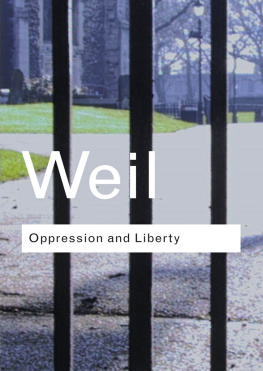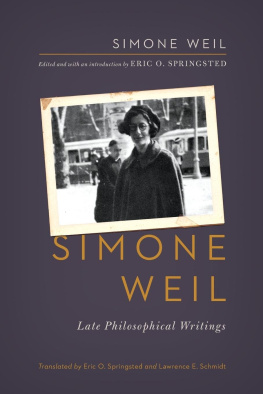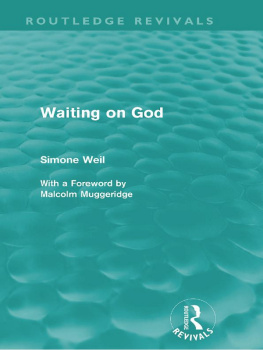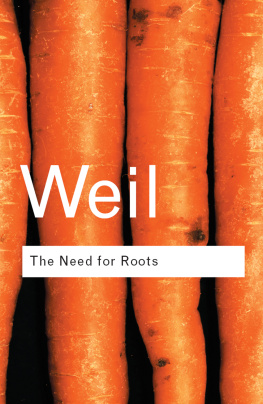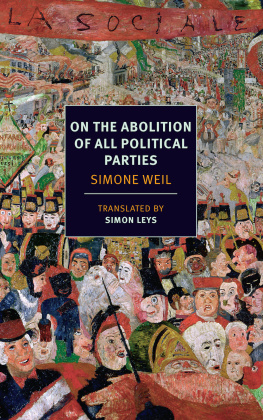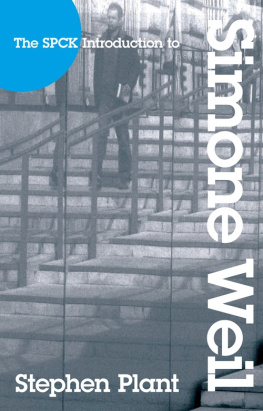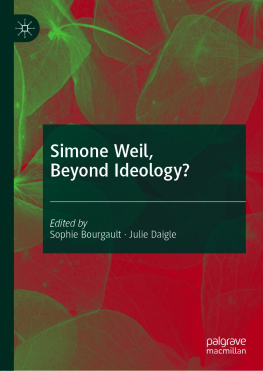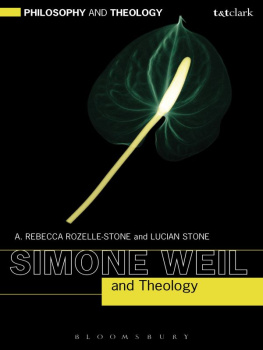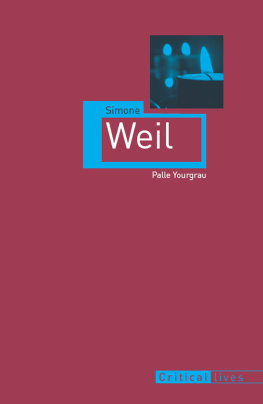Simone Weil
Awaiting God
Simone Weil Awaiting God
A new translation of Attente de Dieu and Lettre un Religieux
Attente de Dieu published 1951 by la Colombe, Paris
Lettre un Religieux published 1951 by Gallimard, Paris
Public Domain in Canada
trans. Brad Jersak with Adit Gamble and Anny Ruch
Copyright 2012 by Brad Jersak
Simone Weil and the Rabbis: Compassion and Tsedekah
by Sylvie Weil
Copyright 2012 by Sylvie Weil
All rights reserved. No part of this publication may be reproduced, stored in a retrieval system, or transmitted in any form or by any meanselectronic, mechanical, photocopy, recording, or any otherexcept for brief quotations in printed reviews, without the prior written permission of the author. For further information, contact Fresh Wind Press at freshwind@shaw.ca
Printed in Canada by Friesens Corporation
To contact the publisher: freshwind@shaw.ca
ISBN: 978-1-927512-03-6
ebook ISBN: 978-1-927512-04-3
Library and Archives Canada Cataloguing in Publication
Weil, Simone, 1909-1943
[Attente de Dieu. English. Lettre un Religieux. English]
Awaiting God / Simone Weil; translated by Brad Jersak and Adit Gamble; including an introduction with Sylvie Weil.
Fresh Wind Press
2170 Maywood Ct.,
Abbotsford, BC
Canada V2S 4Z1
www.freshwindpress.com
Simone Weil
Awaiting God
Translation by Brad Jersak
Introduction by
Sylvie Weil
Contents
Translators Preface /
Introduction by Sylvie Weil /
Part 1 Essays
1. Reflections on the Right Use of School Studies
in View of the Love of God /
2. The Love of God and Affliction /
Forms of the Implicit Love of God /
Love of Neighbor /
Love of the Order of the World /
Love of Religious Practices /
Friendship /
Implicit and Explicit Love /
4. Concerning the Our Father /
Part 2 Letters
Preface to her letters: Weil on Catholicism and Judaism /
Hesitations Prior to Baptism / Jan 1942 - Fr. Perrin /
Hesitations Prior to Baptism / 1942 - Fr. Perrin /
7. Departure from France / Apl 1942 - Fr. Perrin /
8. Spiritual Autobiography / May 1942 - Fr. Perrin /
9. Intellectual Vocation / May 1942 - S. /
10. Last Thoughts / May 1942 - Fr. Perrin /
11. Letter to a Priest / Nov 1942 - Fr. Couturier /
Translators Preface
Brad Jersak
Seventy years after her death, the echo of Simone Weils voice continues to reverberate across the decades. In fact, as the post9/11 West thrashes about in the vain hope of reaping justice by sowing ever more violence, evocations of Weils moral authority and spiritual genius are surging. Political philosopher, liberation activist, Christian mysticshe is catching the attention and imagination of another generation in quest of Truth. Why is that? What fresh prophetic keys do we think she might deliver to our bewildered era?
I was perusing a used bookstore in Vancouver a while ago, mining treasures for my dissertation (a work on George P. Grant and Simone Weil). I found a young intellectual perched behind the cash register. He was your stereotypical hipster/philosopher-poet. Lunch crumbs caught in his tangled beard, noise-metal vibrating from his ear-buds, and the pages of a new-atheist bestseller hovering two inches from antique gold reading-glasses. Classic.
This young thinker apparently doesnt believe in any God; he is contemptuous of all things religious; and reserves his deepest contempt for the Church. He projected a persona of one who uses his spare time to roll his eyes at faith. But heres the thing. He doesnt mock Simone Weil he writes poetry to her.
I know that sentiment. I feel I owe her a debt of love and would love to write a book about her. But theres something more urgent happening. An imperative voice exhorting me, Dont . Dont read and write endless monographs and biographies about Simone Weil. Read her. Listen to her. Undergo her .
To truly hear Simone Weil one must not sort through her work, discerning where we think shes right or wrong, adding her best zingers to our tool-belt and then moving on. That would be listening with deaf ears. Rather, I suggest reading a line at a time until she corners you, arrests you and/or offends you. Stop there. Meditate. Journal. And ask, How is this thought true and how might it not be true? At that point youre beginning to think like her.
Then look into her eyes and ask, What are you saying? To me? About me? About life? About God? And push back. Hard. Tell her shes wrong and tell her why. Then let her circle in again. Let her infuriate you, seduce you and rebuff you. Then repeat this dance. And certainly never move on.
My model for this process is Simones niece, Sylvie Weil. She is certainly no starry-eyed Weilian. But she knows how and why to engage her aunt like no one else. The reader will see this in her book, At Home with Andre and Simone Weil , reviewed below, and in Sylvies fine article, Simone Weil et les rabbins: compassion et tzedaka (originally published in the French journal, Approches No. 148). With Sylvies kind permission and help, we have translated it into English for the first time here.
Translation
My methodology was to begin with the most literal and wooden word-for-word translation possible. In so doing, I hoped to preserve some of Simone Weils repetitiveness where she intentionally uses a specific word or word-play half a dozen times within a few paragraphs. She is being thematic, attempting to drill an idea home very quickly. This helps us cross-reference thoughts that she associates through word association.
To share one example, she sometimes recites the first Beatitude as, Blessed are the void in spirit. Thus, she identifies that passage with Christs kenotic self-emptying in Philippians, which she translates as, He made Himself void . Here we glimpse her doctrine of decreation as a sort of purging of the self to create space for cruciform love.
After this initial pass, I also sought to retain some of the hard sayings and idiosyncrasies in Weil by retaining unusual expressions or jarring word-choices through a more literalist translation. For example, I love the picture she paints when she advocates for the intelligence to play without shackles to the full plenitude of its function. There are clearer ways to render such phrases in Englishlike, allowing the intelligence to freely and fully function. But by then we would be sanitizing the book of Weils poetic style and aphoristic tone.
In simpler instances, I intuitively retained some of Simones trademark French terms like miserable, sentiment or sensible even when an alternative might have seemed more natural.
Having labored through a wooden first draft, Adit Gamble (who truly knows Weils mind) and I worked through many complete rewrites where we (conservatively) wrestled French sentence structure into a more common English order. We rearranged some qualifying phrases, reduced the passive verbs, dropped some of the French subjunctives and many, many occurrences of that. We have frequently replaced the older pronoun one or gender specific he with someone or we to give the work a more natural flow. This also meant employing the glorious new liberty known as the singular they, using third-person pronouns to refer to singular indefinite, gender-neutral antecedents. Readers will also occasionally see bracketed material where I felt amplification was required to express the semantic-range, ambiguity or Weilian sense of a word.
I have chosen to retranslate the two works herein under the title, Awaiting God , knowing that good translations of Waiting for God and Letter to a Priest have been around for decades. By creating a single edition in conjunction with Sylvies poignant perspective, I hope to encourage a new generation of Weil readers to ponder her provocative wisdom.



